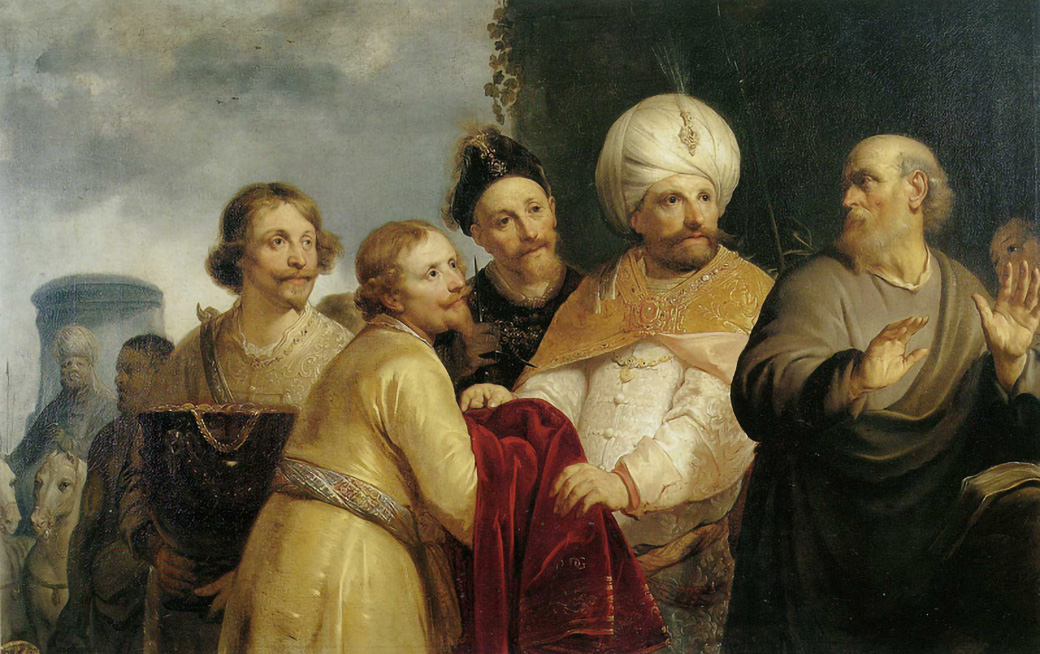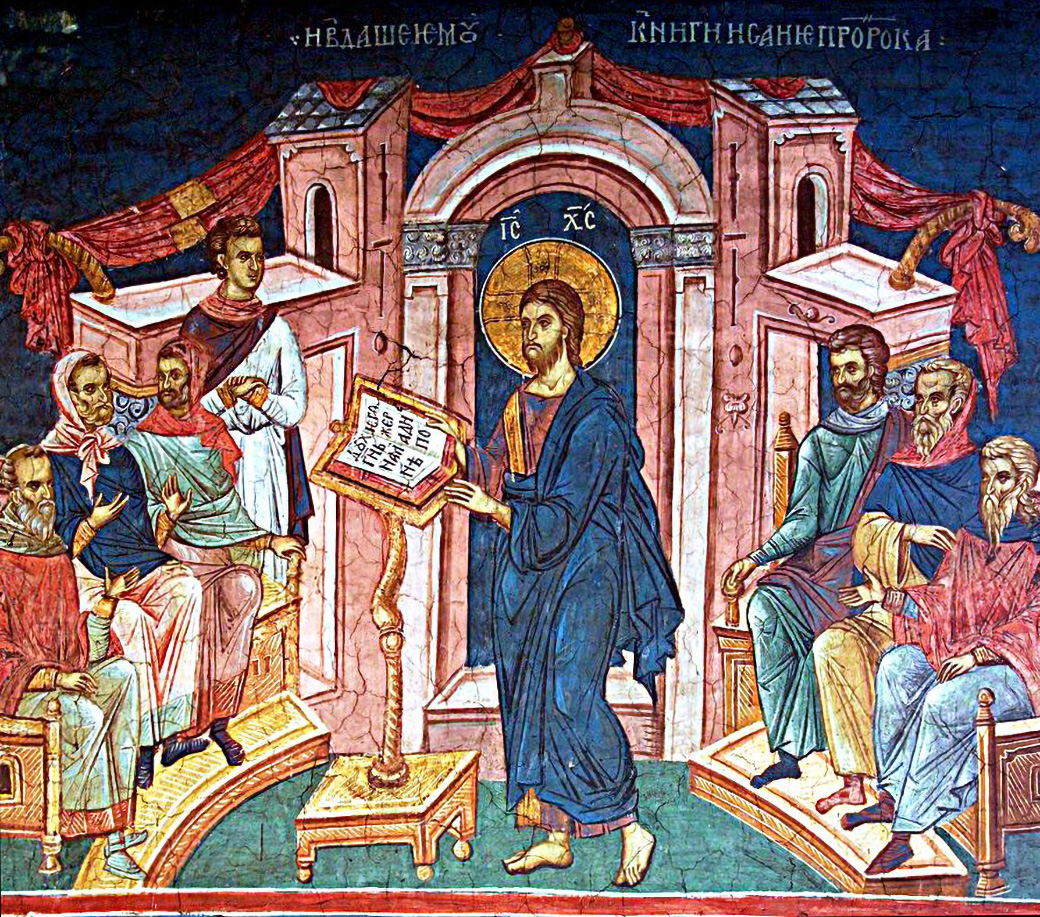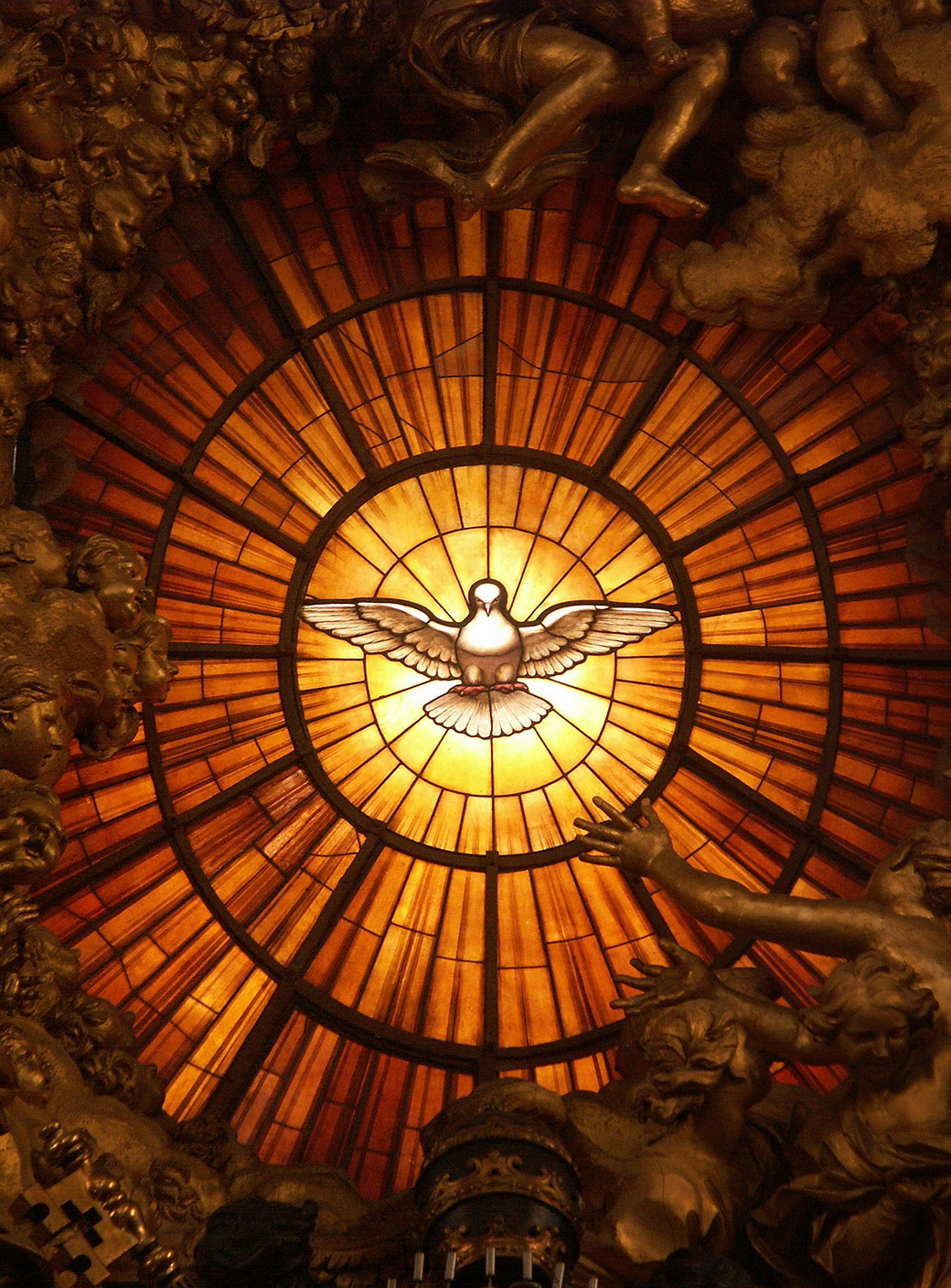Monday in the Third Week of Lent: 2 Kings 5:1-15, Luke 4:24-30.
Today’s readings are an excellent example of how the New Testament can help to clarify seemingly incongruous events in the Old Testament. It’s a good reminder of how the fullness of God exists outside of (yet operates within) linear time and history.
When I first read the second book of Kings and encountered the prophet Elisha I had to do a double-take. Does this book really describe how he fed a hundred people with 20 loaves? How he cured lepers, knew men’s hearts and deeds without them saying, and even raised a boy from the dead?? These are too close to Jesus’s miracles to be a coincidence. Nearly 900 years before Christ, we encounter a prophet, the disciple and successor to Elijah, who performs very “Messianic” miracles. What do we make of this?
I think it’s safe to say that Elisha prefigures Jesus and the New Covenant that will be established. Let us remember that the prophets were men and women who dedicated themselves utterly to God, who lived righteous lives and were granted special graces from God, enabling them to do his will in extraordinary ways. Above all, prophets were the mouthpieces for the Word of God. That same Word is, of course, Jesus Christ. When they perform miracles, the Spirit works in the world through them, much in the way that the Word is spoken by them. Thus, it is God, the Spirit and the Word, who works through Elisha. Christ is performing works in a time long before His coming in the flesh as a way to prepare the hearts of humanity for the new reality He will bring.

When we realize that God works (and has always worked) in the world through us, it should come as no surprise that those speaking and acting in truth are being used by Him in similar ways as He will act as Jesus in the flesh.
Let us see the ways Christ is operating in human history 900 years before his Incarnation. In today’s reading, we find a Syrian (Aramean) general, Naaman, who learns from a captured Israeli servant girl that there is a prophet in Israel who can cure his leprosy. Note that Syria is an active enemy of Israel at this time, and in just the next chapter of 2 Kings, Elisha helps to thwart an Aramean attack. So Elisha asks the king of Israel to send Naaman, not just an outsider from the tribe of Israel but an enemy, to him. When Elisha asks for Naaman to be sent to him, we hear earlier echoes of Jesus (like a pebble dropped in time that ripples both backward and forward on our timeline): “Love your enemies and pray for those who persecute you” (Mt 5:44, see the reflection The Difficult New Covenant of Love). Elisha tells Naaman, “Go and wash seven times in the Jordan, and your flesh will heal, and you will be clean.” The Jordan River will become the workplace of St. John the Baptist in his mission of repentance and preparing the way for Christ. Just as John washes sin away in the Jordan, Naaman will wash away the uncleanliness of leprosy. Moreover, Christ (through Elisha) is performing the first baptism of a Gentile in the Spirit of the Lord. This will become the New Covenant, salvation opened up for the entire world through baptism in Jesus’s name.
Naaman, the great commander with his horses and chariots, gets angry. He expected more of a show, perhaps more attention and honor given his status. Elisha, for his part, acts like Christ might, not impressed by worldly power. For Naaman, why travel all this way just to be told to jump in Israel’s little river, no match for the great Syrian rivers? Here we see the ever-present challenge of faith presented to us in the scriptures. And who is it but the lowly servants who have faith and encourage Naaman to follow Elisha’s instructions? “Blessed are the poor in spirit,” says our Lord.
When he is cured of his leprosy (through faith, encouraged by the lowly), he returns to Elisha to profess his newfound faith in the Jewish God. What is omitted in today’s reading is that he also wants to bestow lavish gifts on Elisha for his miracle, but Elisha refuses them, saying, “As the Lord lives, whom I serve, I will accept nothing!” This is concordant with our teaching that God’s gifts are given freely to us, who do not deserve them.

Without Christ and the New Testament, I find that Elisha’s deeds stand out as exceptional but a little pointless. What happens when he dies but more of the same for God’s people? They remain in an endless holding pattern of ritual observance and sacrifice, praying for God’s protection and grace in this world. Elisha did great things, but then he died like the other prophets. He reveals some important things about God, but they don’t really coalesce into their fullness until Christ. To Jews of the time, for instance, what’s the point of healing an Aramean leper general when they’re fighting for their nation’s survival?
This is where our distance from these events is a grace in itself. We are able to make connections between the Old and New Testaments in a way countless millions were never able to. The Second Vatican Council’s Dogmatic Constitution on Divine Revelation, Dei Verbum, remarks pointedly on the relationship between the testaments: “God, the inspirer and author of the books of both Testaments, in his wisdom has so brought it about that the New should be hidden in the Old and that the Old should be made manifest in the New. For, although Christ founded the new Covenant in his blood, still the books of the Old Testament, all of them caught up into the Gospel message, attain and show forth their full meaning in the New Testament and, in their turn, shed light on it and explain it.” Today’s reading is an excellent example of how the “New should be hidden in the Old and the Old should be manifest in the New.” I also appreciate how the Council points out the reciprocal nature of this relationship, how the Old Testament can shed light on the New while at the same time its stories show their full meaning in the New Testament. This attests to the nature of God Himself, who is fully active at all times, both within time and outside of it.
The notion of “fullness” is important here. Let’s start with a definition of fullness as the completeness of abundance; that is, something that is already abundant and overflowing somehow being complete. The proposition of our faith is that the fullness of God inhabits the universe at all times. He instructs Moses to tell the Israelites: “I AM has sent me to you.” His name, his being, is summed up in eternal being. At the risk of our heads exploding over the ontological implications of God’s being (which we can never truly comprehend until we come face to face with Him), let’s listen to some wisdom from our Church Fathers. St. Gregory Nazianzen says, “God always was and always is, and always will be; or rather, God always Is. For Was and Will Be are fragments of our time, and of changeable nature. But He is Eternal Being … like some great Sea of Being, limitless and unbounded, transcending all conception of time and nature” (~388 AD, Oration 45, The Second Oration on Easter, III). The fullness of God’s being is limitless and unbounded, transcending time.
God’s revelation has taught us some other things about His fullness: He endlessly pours His Spirit and love upon His Creation, especially humanity in which He incarnated His Son. He tirelessly calls us to Him, thirsts for us (see the reflection If You Knew the Gift!), with inexhaustible forgiveness in His heart. Thus, the fullness of His being in all time is characterized by His love, care, and thirst for us. He meets us in our mortal reality of linear time through a progressive revelation of Himself, yet at every stage of revelation, He and His ultimate message are fully there.
(As a side note, when I read of the “immensity” of God, I think of this very fullness of his being.)
In all the similarities between Christ and early prophets like Elisha, let us not forget that Christ is also the most exceptional historical figure, the most blessed man, the Anointed One of God. While the Word and Spirit work through the prophets, the Word itself is joined with mankind in Jesus Christ. This manifestation of God on earth is greater than all of the prophets, it is the perfection of the Law and the Spirit. Humans can only try to uphold the law and live in the Spirit from the distance of their mortality while Jesus is the actual manifestation of the Law and Spirit, incomparable to us in His essence. His miracles supersede Elisha’s in every way — Christ feeds 40,000 while Elisha feeds 100, Christ heals 40 lepers while Elisha heals one, etc. Interestingly, we are told that when a dead man is buried near Elisha’s bones and touches them, he immediately jumps back up, alive. Christ, on the other hand, brings eternal life for all of humanity.

So what do we make of Jesus in today’s reading being the prophet not accepted in his “native place”? I always saw this as a sad, personal low point for Jesus. But upon reflection, I think I was dead wrong. In fact, it’s a pretty triumphant moment, where he gives us the reason for Elisha’s incongruous act of healing non-Jews in difficult times. Remember, the Nazarenes in his hometown had just heard him say that the fulfillment of Isaiah’s prophecy was him, standing in front of them. They were astounded. Then he says that they might be expecting a miracle from him, but no such thing would happen (this is where our reading picks up).
He declares, “no prophet is accepted in his own native place,” and thereby tells them that he will not be working wonders in their midst. Then he uses an episode in Elijah and the story of Naaman and Elisha as proof that prophets are to work wonders for those outside their “native place.” This infuriates them. They must have felt brushed aside, as if he was saying they weren’t worth the trouble. Worse yet, that non-Jews and pagans were more deserving of God’s graces than they were. So they mob him and push him out of town with murderous intent.
And the miraculous thing upon which our reading might hinge: “But he passed through the midst of them and went away.” Whaaaa? How mysterious … like the wind or a spirit. Exactly. although not “a spirit,” but THE Spirit. Jesus physically redoubles his message by passing directly through the midst of them, as the grace of God being taken from them and given to others. This is, of course, the message he will continue to spread when he talks with the Samaritan woman, welcomes and eats with sinners, and more. The Good News is that eternal salvation is being offered to all peoples, all nations through Christ. This significant broadening of salvation beyond the nation of Israel is a large part of his ministry, and it begins here in his hometown of Nazareth.

This new salvation is brought about in the Spirit, and Jesus “passing through the midst of them” establishes in symbolic form this message. He voices this message later to Nicodemus the Pharisee: “You must be born from above. The wind blows where it chooses, and you hear the sound of it, but you do not know where it comes from or where it goes. So it is with everyone who is born of the Spirit” (Jn 3:8). In fact, the Greek here shows that wind (πνεῦμα, pneuma) and Spirit (Πνεύματος, pneumatos) are the same word. The lack of stable physical location for the wind/Spirit is the same for those who are “born of the Spirit,” i.e., baptized as Christians. They no longer belong to Israel, to particular castes or families, but to God, not of this world.
Thus, like the wind and the Spirit, “he passed through the midst of them and went away.”
This does not mean that Nazarenes (and Israel as a whole) are not welcome in the Kingdom, simply that they need to understand that the Old Covenant establishing them as the Chosen People is being replaced by a New Covenant that is not bound by a place or a nation. They are the first, in fact, to be invited into the New Covenant to be born by the Spirit.

So what are we to make of the fact that they were told by God that they were the Chosen People for the prior several millennia? Just like Elisha’s deeds only making sense as a prefiguring of Christ’s opening up of the New Covenant, we can see the appelation “Chosen People” making sense in Christ as well. They were chosen to receive the prophets, to prepare the hearts of mankind for the Anointed One, the Son of God, to be born into their tribe and then open up the Kingdom to all. Importantly, the millennia of God working within his Chosen People led to Mary the Mother of God being trained by generations of those abiding by the law of God. She was perfect in mind, body and spirit, ready to say yes to God, to be the Ark of the New Covenant.
Therefore, let us look past the anger of the Nazarenes and read the triumphant message in today’s gospel. Jesus is never defined by the fact that he is not accepted but hated. He bears it all willingly because His message is not about Himself as a man, but Himself as our Savior.
Pingback: Drawn by the Father to the Son so we can return to the Father